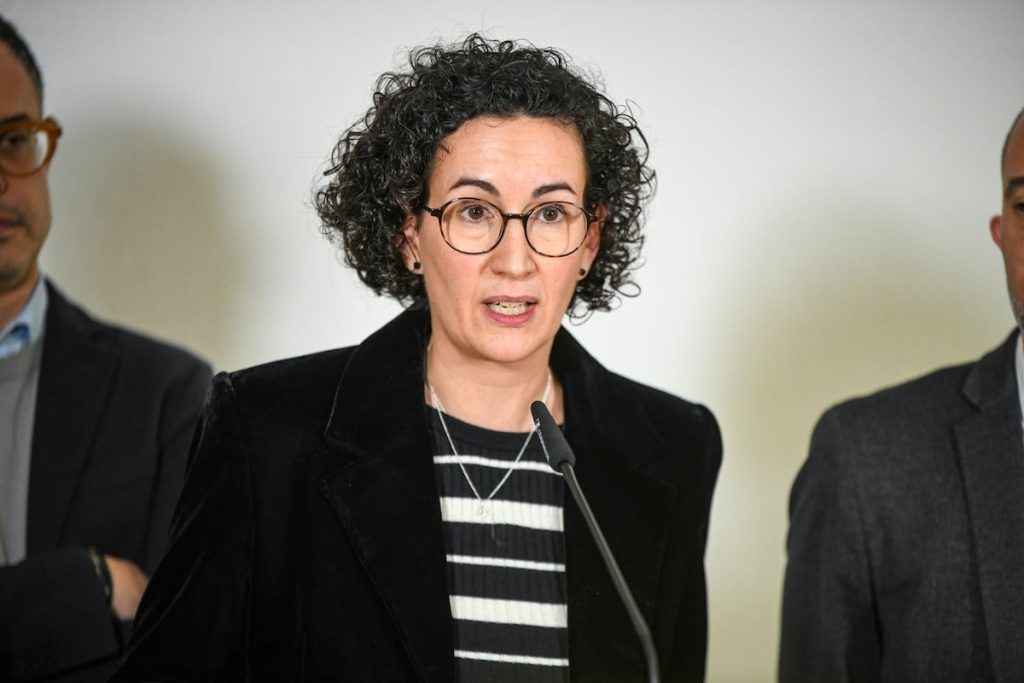Marta Rovira, the secretary general of Esquerra Republicana, has refrained from taking a stance on whether her party should join the government of socialist Jaume Collboni in Barcelona. In the aftermath of a tumultuous congress of the Barcelona Federation, postponed due to the overwhelming attendance of party members and the inability to accommodate them in the chosen auditorium for the vote on the government agreement, the number two of ERC has defended the idea that the party’s members should vote on such a decision and has offered the national resources of the party to ensure that there are no setbacks in the next assembly. The vote, Rovira has stated in an interview on the program Aquí Catalunya, on SER Cataluña, will take place “in the coming days,” avoiding giving any hints as to whether it will be after the investiture debate of the President of the Generalitat, scheduled for June 25. The national leadership of ERC is currently negotiating with both Junts and the PSC regarding the election of the head of the government, although the shared idea for now is to go into opposition. The events in Barcelona add tension to already complicated discussions, as the massive mobilization of the party’s members in the Catalan capital was fueled by those opposed to the pact.
Rovira, the future leader of the Republicans, has stated that she has not met with either Junts or the PSC after the negotiations for the Parliament’s Mesa and has said that she is waiting for their proposals. She did, however, reference statements made by the First Vice President and Minister of Finance, María Jesús Montero, ruling out special financing for Catalonia. Rovira has called for negotiations to be kept out of the media spotlight. Her refusal to take a position on whether ERC should join the government in Barcelona reflects the internal divisions within the party and the delicate balancing act that the leadership must perform in navigating the complex political landscape in Catalonia. The outcome of the vote among party members will have significant implications for the future direction of the party and its relationship with other political forces in the region.
The upcoming vote on whether ERC should join the government in Barcelona comes at a critical moment in Catalan politics, with negotiations ongoing between different parties to form a new government in the region. The national leadership of ERC is currently engaged in talks with Junts and the PSC to determine the best course of action for the party moving forward. The decision to go into opposition, as the current shared view is, or to join the government will have significant consequences for the party’s future and its ability to influence policy in Catalonia. The internal dynamics within ERC, as well as the external pressures from other political forces, create a challenging environment for Rovira and other party leaders to navigate.
The tension within ERC over whether to join the government in Barcelona reflects the broader political uncertainty in Catalonia, with ongoing negotiations between different parties to determine the future direction of the region. The massive mobilization of party members in Barcelona against the pact with the PSC adds a further layer of complexity to the situation, highlighting the deep divisions within ERC and the challenges of maintaining party cohesion in the face of differing opinions. Rovira’s call for the party’s members to vote on the decision reflects an attempt to ensure transparency and inclusivity in the decision-making process, but also highlights the difficulty of reaching a consensus within the party.
The negotiations between ERC, Junts, and the PSC over the formation of a new government in Catalonia are further complicated by the recent statements made by María Jesús Montero ruling out special financing for the region. The financial issue is a central point of contention in the negotiations, with Catalonia seeking greater financial autonomy and resources from the central government. Rovira’s plea to keep negotiations out of the media spotlight highlights the sensitivity of the issue and the need for confidential discussions to reach an agreement that satisfies all parties involved. The outcome of the negotiations will have far-reaching implications for the future governance of Catalonia and the relationship between the region and the central government in Spain.
In conclusion, the decision by Marta Rovira to refrain from taking a position on whether ERC should join the government in Barcelona reflects the complex political landscape in Catalonia and the challenges facing the party in navigating internal divisions and external pressures. The upcoming vote among party members will be crucial in determining the future direction of ERC and its role in the region’s governance. The negotiations with Junts and the PSC over the formation of a new government are further complicated by the financial issue, with Catalonia seeking greater autonomy in this area. Rovira’s call for transparency in the decision-making process is an attempt to ensure inclusivity and fairness, but also reflects the difficulty of reaching a consensus within the party amidst differing opinions and external pressures.


